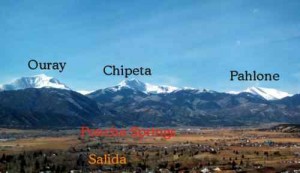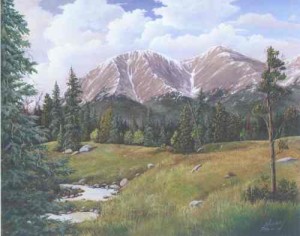Review by Marcia Darnell
Local History – December 2004 – Colorado Central Magazine
Nicholas Creede & the Amethyst Vein
by Mary F. Schroder
available from the author for $15.50 per copy from:
Bonanza Books, P.O. Box 601, Creede CO 81130
NICHOLAS CREEDE’S life was a classic story of the Old West. Born in poverty in Indiana, he migrated West to — you guessed it — seek his fortune. Secrecy, betrayal, phobias, wealth, poverty, swindles, generosity, and deceit: this story has it all.
Born William Harvey in Indiana in 1843, Creede provided for his poor family as an expert marksman hunter. When he was 18, that same family, needing fewer mouths to feed, told him to leave. Harvey made his way west, working as a lumberjack and Indian scout. Finding the former too harsh and the latter too dangerous, he decided to find easier riches in the mining camps of Colorado.
In Denver a man named Billy Harvey committed murder and precipitated a prairie war; whereupon William Harvey changed his name to Nicholas Creede. It’s not crystal clear whether Creede did it to differentiate himself from that Harvey, or whether he was that Harvey, or whether he did it to distance himself from his family (research indicates that his sweetheart married his brother).
Creede succeeded as a prospector in Monarch, Leadville, Del Norte, and Saguache. His new name became synonymous with mining, especially after he spent five years visiting every major mining operation in the West.
His biggest discovery was the Amethyst Vein. The mining camp which sprang up around that mother lode became the town of Creede, in honor of his success and notoriety. In his honor, the first baby born in the camp was named Creede Amethyst.
When the first shipment of silver ore went out by train, the town celebrated with a major bender. Nicholas Creede awoke to find himself in New Mexico and married to Nancy Louisa Kyle, who’d been married three times before and ran what was politely called a “boarding house” in Del Norte.
Creede disliked his new wife and did everything he could to get rid of her, but she was too wily and greedy to go. His riches also attracted the attentions of speculators, including David Moffat, whom he mistrusted but formed a partnership with anyway.
Several factors contributed to Nicholas Creede’s downfall, including poor health from years of hard labor under bad conditions; a fear of going into tunnels, which prevented him from personally checking his mines; and a bad marriage, which increased his stress. He was cheated out of a fortune in his mines and moved to Los Angeles. There he learned of an abandoned baby girl, whose grandfather he’d known. Creede adopted the little girl, named Dorothy, and made her his primary heir. Soon thereafter he died of an opium overdose.
It’s not easy tracing someone through the 19th-century west, but Schroder, a part-time Creede resident, has verified as much as anyone can. She’s upfront about what’s verified and what’s speculation, and her endnotes are as interesting as the book itself. She includes a complete index of research materials, too, for those who want to read more about Creede the man and Creede the town.
The life of Nicholas Creede is a cautionary tale, a colorful saga, and a history of the Old West. Lovers of biographies, history, mining, and Westerns will be intrigued by this story.
–Marcia Darnell


